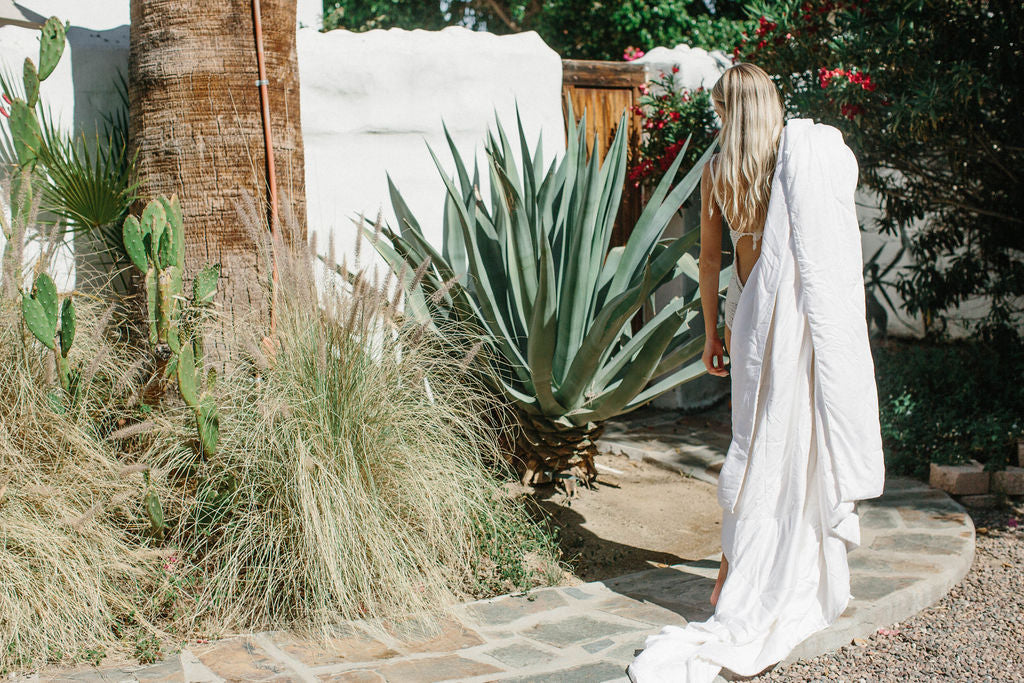
Finding the best material for a comforter will provide you with the utmost comfort any time you are relaxing or sleeping. Of course, what is deemed ‘the best material’ tends to be down to personal preference, so it’s often difficult to know which one you like the most without trying it first.
However, there are many popular choices of materials for comforters, so you are sure to find one you love. From natural to synthetic, there are many types of materials that you could opt for in a comforter, but the following are generally viewed as the most comfortable:
5. Cotton
As the most widely used fiber in the world today, it should be little surprise that cotton is viewed as one of the most comfortable materials for a comforter.
Smooth and soft to touch, cotton is also very effective at absorbing sweat and moisture, resulting in an incredibly pleasing material to sleep on. Helping to keep the body cool and comfortable, there are fewer better materials for a comforter than cotton.
Check out our article, bamboo sheets vs cotton sheets to get the full breakdown on the differences between the fabrics. To sum it up shortly, bamboo makes a much softer fabric, takes less dye, and is better at regulating temperature.
The biggest issue with cotton is that since it is so widely used, it's near impossible to differentiate the good from the bad. To see this all you need to do is go to amazon and search cotton comforter covers. You will undoubtedly get duvet covers (comforter cover) ranging from $20 to $280.
So how can you distinguish? You really can't.
We wrote a popular article recently on the truth about thread count. Again, read the article for the full version, but essentially many companies today inflate thread counts by triple counting. They will count individual plies that make a single thread. Read the article on how to sort through other characteristics of bedding and how to tell if what you are buying is good quality.
Cotton comforter covers can be great, but really most of whats on the market is low quality that is scratchy and cheap. To get the best you are going to have to shell out quite a bit.
4. Wool
A suitable material for anyone looking for a comforter to keep them warm. Given its unique texture, wool is very effective at retaining heat from the body. It does this by utilizing thick tangled fibers to trap heat.
Of course, overheating is an issue, but for those winter months it can be great to snuggle up in.
This also comes with a steep price tag unfortunately as real wool is expensive.
- Not many options
- Overheating can be an issue
- Real wool comforters are expensive
- Ideal for very cold climates
3. Silk
When it comes to soft and luxurious materials, there aren’t many better options out there than silk. Owning a silk comforter cover will certainly provide a high level of comfort for most, and there are a quite a few benefits to be enjoyed.
For instance, as silk isn’t processed with chemicals it is 100 percent hypoallergenic, which is ideal for anyone that struggles with allergies, while also being highly breathable to allow excess body heat to escape.
Silk absorbs as much as one-third of its total weight in moisture alone, yet still allows any excess heat to escape. This allows any moisture to evaporate before building to the point of discomfort, highlighting just how great a material silk is for comforters.
Silk:
- Silky
- Wrinkly
- Hard to find good quality that isn't overpriced
- Durability issues
2. Down
A common choice for many when it comes to comforters is down. Down is the fibers that lie beneath the protective feather covering of a goose or duck. People have been using down for centuries to keep warm in the winter. Russians actually sold it as early as the 1600s to Dutch merchants.
- Incredibly warm
- Very puffy feeling
- Expensive for quality down
- Most down isn't ethically harvested, a single comforter can use 75 geese.
1. The Best Material For Comforters: Bamboo
Bamboo bedding is becoming increasingly popular thanks to its amazing properties that produce a very luxurious feel – but without the excessive costs of other luxurious materials.
Providing breath-ability, softness, yet the ability to retain warmth puts bamboo comforters at the top.
The reason bamboo comforters are becoming so popular is because they are the single best choice when it comes to mild to extra hot sleepers.
The woven construction allows for air to pass back and forth in the comforter which creates an even warmth with no hot spots.
So what's good about bamboo?
- Incredibly breathable - thick fibers let air pass back and forth easier.
- Perfect for couples who sleep different, hot/cold
- Fluffy
- Silky
- Priced fairly
Choosing the right Bamboo Comforter
When choosing you need to think about how you sleep and based on that choose a weight.
Are you a hot sleeper?
If you sleep hot but like to be covered the 200GSM bamboo comforter will be your best bet. GSM stands for grams per square meter, lower means a tighter comforter that is perfect for the summer time or year round depending on how hot you sleep.
Check out the Light Weight Bamboo Comforter
Are you a cold sleeper?
If you sleep cold, the 350GSM bamboo comforter will be ideal. It is filled with extra fluff to ensure warmth but unlike other comforters won't make sweat. Because it's made with bamboo it will breath easier and keep you evenly warm.
Check out the Light Weight Bamboo Comforter

